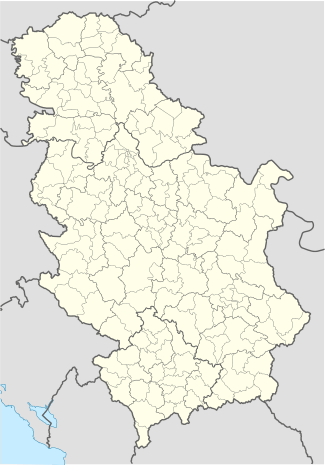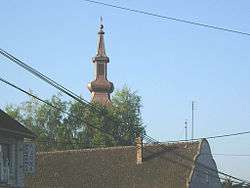Grebenac
| Grebenac Гребенац Grebenaț | |
|---|---|
| Village | |
|
The Romanian Orthodox Church | |
 Grebenac Location of Grebenac within Serbia | |
| Coordinates: 44°52′21″N 21°15′11″E / 44.87250°N 21.25306°ECoordinates: 44°52′21″N 21°15′11″E / 44.87250°N 21.25306°E | |
| Country | Serbia |
| Province | Vojvodina |
| District | South Banat |
| Elevation | 60 m (200 ft) |
| Population (2002) | |
| • Grebenac | 1,017 |
| Time zone | CET (UTC+1) |
| • Summer (DST) | CEST (UTC+2) |
| Postal code | 26347 |
| Area code(s) | +381(0)13 |
| Car plates | VŠ |
Grebenac (Serbian Cyrillic: Гребенац, Romanian: Grebenaț) is a village in Vojvodina, Serbia. It is situated in the Bela Crkva municipality, in the South Banat District, Vojvodina province. The village has a Romanian ethnic majority (82.3%) and a population of 1,017 (2002 census).
Name
In Serbian, the village is known as Grebenac (Гребенац), in Romanian as Grebenaț, in Hungarian as Gerebenc, and in German as Grebenatz.
Historical population
Romanian presence is attested by a stone cross in the local graveyard, from 1297 and by a document in Wiena about a trial between Luca family and another local family.
- 1961: 2,129
- 1971: 2,040
- 1981: 1,893
- 1991: 1,608
Personalities
- Vasko Popa, poet; studies at the University of Bucharest and in Vienna. During World War II, he fought as a partisan and was imprisoned in a German concentration camp.
- Petru Lungu, soldier in the Romanian Army in the Second World War. Participant in great battles near Stalingrad. Also fought against German troops in 1945. Finally enrolled in the Foreign Legion, and captured by Vietnamese army at Dien Bien Phu, last battle of French colonialists.
See also
References
- Slobodan Ćurčić, Broj stanovnika Vojvodine, Novi Sad, 1996.
External links
| Wikimedia Commons has media related to Grebenac. |
This article is issued from Wikipedia - version of the 6/10/2016. The text is available under the Creative Commons Attribution/Share Alike but additional terms may apply for the media files.
